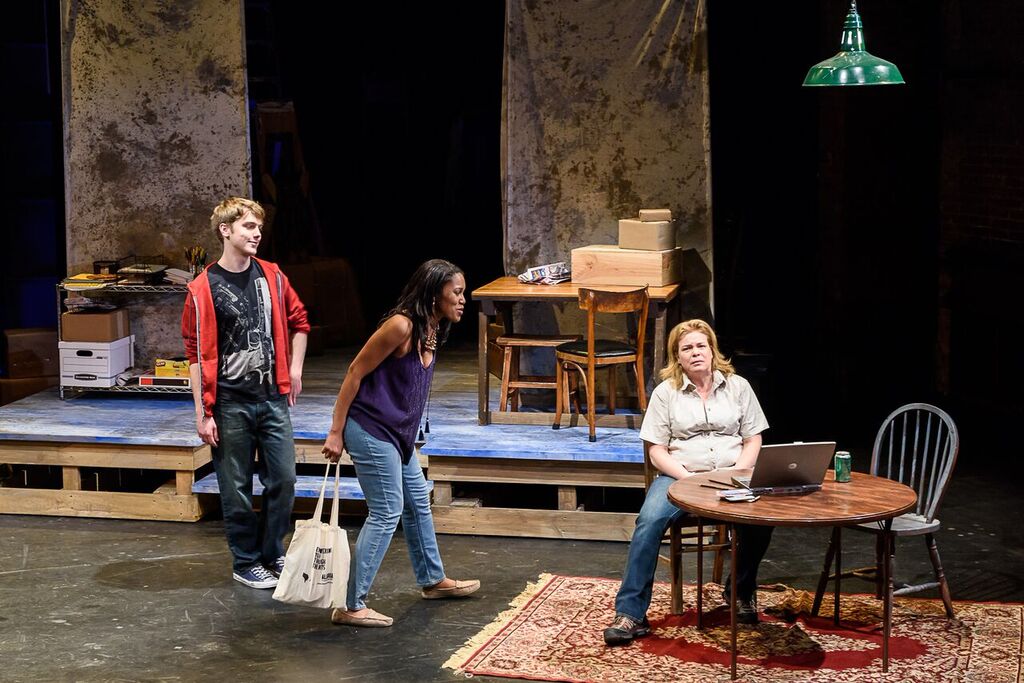A Mash-up of Love, Injustice and Power in Our Time, For All Time
by Carole Di Tosti
Resonance Ensemble is presenting an elucidation of the elements of greatness in Cyrano de Bergerac by Edmond Rostand with an intriguing conceptualization in its repertory. On various nights, one may see its production of Cyrano de Bergerac directed by Gabriel Barre. On other nights one may see a production of Burning by Ginger Lazarus directed by Eric Parness. Burning has been inspired by Cyrano de Bergerac’s plot and themes with additional elements and twists updating the storyline. Both productions are meant to be seen in tandem as they enhance one another’s understanding of how much human behavior appears to have changed but remains ironically the same across the centuries and amongst cultures.
Lazarus has conceived of an intriguing take on Cyrano’s themes of misapplied amour, duplicity, love’s unattainable ideals and the nobility and self-sacrifice of the one who loves truly and altruistically. She accomplishes much of this through her Cyrano-adapted plot and her characterization of Cy. The conflicts and the plot are well conceived, trenchant, illuminating. On the other hand, the characterizations are problematic and how they are developed diffuses the felt power and importance of the vital issues Burning targets.
Cy, like Cyrano, has been daunted by a “flaw” that overshadows her happiness and thwarts the ease with which she is able to find requited love. But her inner being is unlike Cyrano’s and her soul is so wounded that she is unable to transcend the “blight” of being gay with humor, irony or wit. Where Cyrano’s soul is sheer delight and his positive energy, wit and enthusiastic wordplay transforms the hearts of those around him to admiration and love, rendering invisible his huge proboscis, Cy compensates in her writing and with a rich inner life of poetry; but this never externalizes to sardonic, witty humor that could help her more easily bare up under her sorrows. Cy is confrontational, adversarial and dour. She has been so beaten down by discrimination, cruelty and injustice that she cannot use her acumen which, though it may be as ripe and brilliant as Cyrano’s, is of a dolor too dark to enable her to leap over her own self-destruction. This turns into ignoble self-destruction because it inadvertently harms those around her, especially those she loves.
In the backstory we learn that Cy has been shamed out of the military because she is gay. To survive she has opened up a store out west near the base, though she is continually persecuted, as is Sammy, a gay teenager who helps her and whom she is inspiring to go to college. Cy has culled her artistic poetic soul and honed her writing skills as a blogger and advocate who blows the whistle on abuse, discrimination and criminal behavior by those in the military’s upper echelons of power.
As Cy takes on various abusers with her articles, we admire her nobility, courage and sacrifice to fight egregious injustice. However, in her relationships, as the character of Cy is written, little of the nobility and brilliance is expressed and she comes off as an angst-ridden, aggrieved and reluctant friend of Rose, the unknowing object of her love. As she helps Rose and Cole establish a love relationship (as Cyrano serves as counsel to Christian in wooing Roxanne-Cyrano’s idealized love), we question her judgment and do not empathize with her emotions, which we should. This is a flaw in the development of her character.
The most thrilling parts of Burning occur during the scenes when Catherine Curtin as Cy confronts Chris Ceraso, as Colonel Dulac, her former boss. Both actors are at their best in these scenes which pinpoint the horrific sexual abuse that still persists today in the military. Cy reveals what she has discovered, the attempts to cover it up, the leniency toward the malevolent perpetrators because of their high rank and additional nefarious crimes. Of course the irony is that Dulac can “do little” because the others above him command the situation and make the decisions. Jobs will be lost and some may even be killed to prevent the truth from coming out. Lazarus, the actors and director have done their finest work in these scenes.
Though Shaun Bennet Fauntleroy and Sean Phillips as Cole are at times powerful and convincing in developing how their physical desire wanes as they discover they are not compatible–especially upon revelation of the truth of Cy’s letter writing–overall, their dialogue falls short of engagement. It is a credit that the actors are excellent and override these elements, especially in the last confrontation scene when Cole’s rage builds and we believe Phillips’ anger is strangely just.
Unfortunately, the dialogue of the last scene, which could be soaring, becomes anti-climactic. The arc of the concluding action is believable. But Cy/Curtin’s nobility and the poignance of her love, which has been pent up and unspoken for so long, falls drearily flat when she finally expresses it to Rose. Curtin’s performance at this juncture feels forced.
Overall, the sets, music and lighting suited beautifully and the direction adhered. But, Burning should be seen for its innovations and its vital subject matter which is housed in an intriguing, if wobbly, reverse set-up of Cyrano. The characters are at times powerful, while at others they are inelegantly drawn by Lazarus, with a tendency toward heavy-handedness which dulls the effectiveness of the build-up at the end. Would Lazarus have configured Cy’s dialogue with more of the brilliance of sardonic irony and dripping, steely dark charm throughout, the end might have been truly dynamic. In life the sharpest humor is produced by the greatest pain.
Cyrano de Bergerac and Burning. Through February 28. Presented by the Resonance Ensemble at The Theatre at St. Clement’s (423 West 46th Street, between Ninth and Tenth Avenues). www.resonanceensemble.org
*Photos by Jon Kandel





















